Nelson College: Leadership and Management in Service Industries Report
VerifiedAdded on 2023/01/10
|13
|4104
|47
Report
AI Summary
This report, prepared for Nelson College London, examines leadership and management principles within the service industry, using Marriott International as a case study. The report explores classical management theories, various leadership styles (autocratic, democratic, coaching), and their application within the chosen organization. It delves into talent management as a critical leadership model, analyzing internal and external factors influencing talent management styles, along with their strengths and weaknesses. The report further outlines effective talent management strategies, discusses the importance of both hard and soft skills, and highlights current and future management and leadership skills essential for success in the service sector. The report also covers the importance of talent management and concludes with a summary of key findings. The report aims to provide a comprehensive overview of leadership and management in the service industry, with a focus on practical applications and strategic insights, which will be useful for students on Desklib.
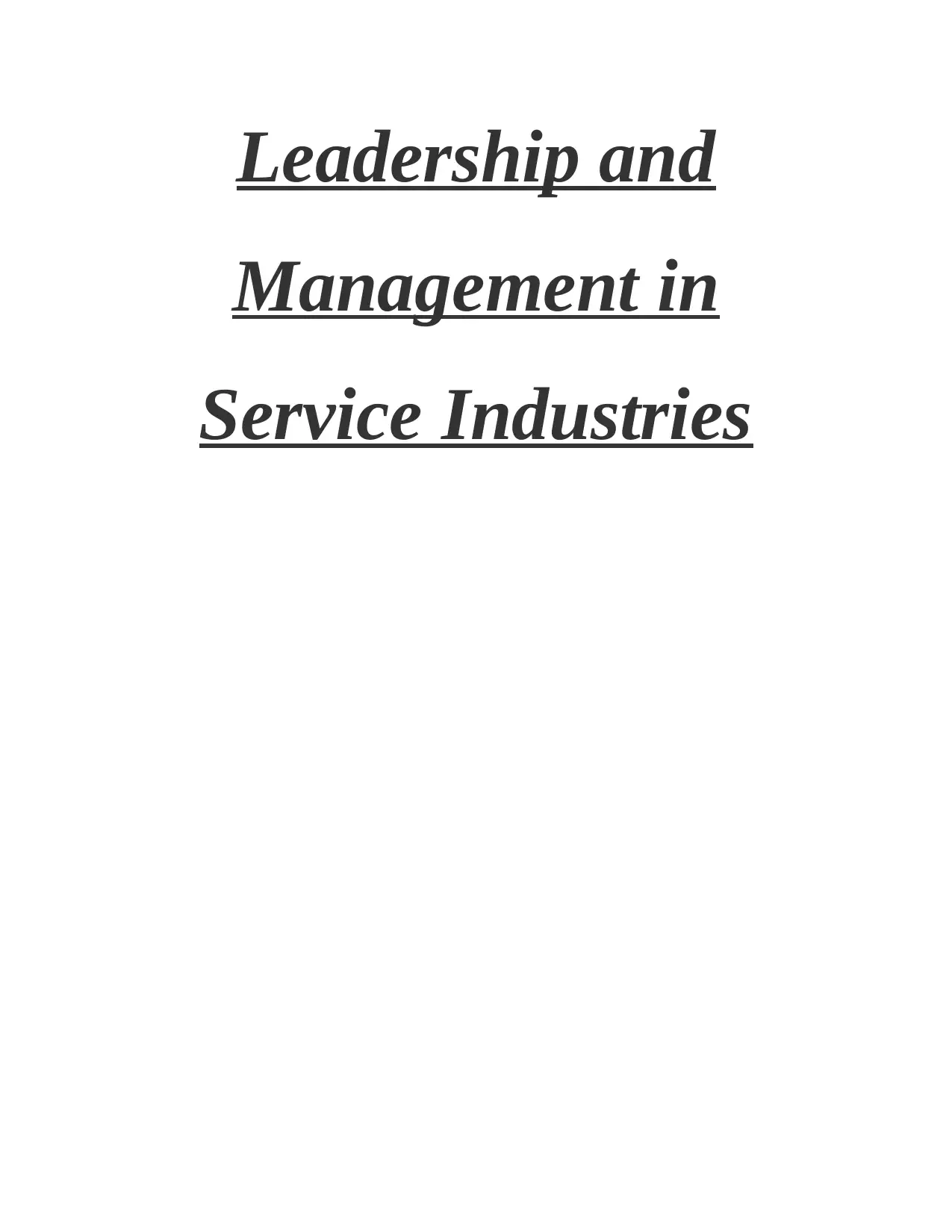
Leadership and
Management in
Service Industries
Management in
Service Industries
Paraphrase This Document
Need a fresh take? Get an instant paraphrase of this document with our AI Paraphraser
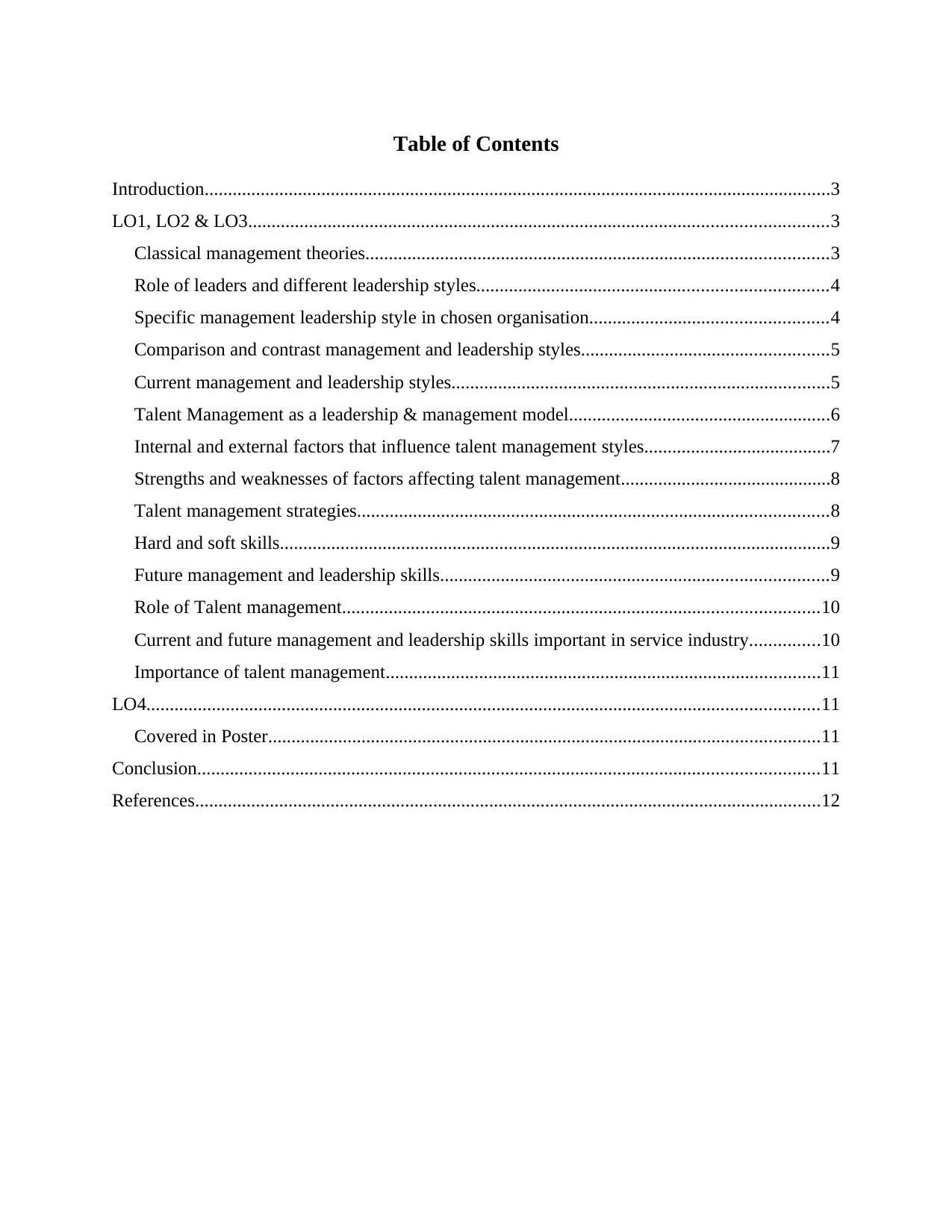
Table of Contents
Introduction......................................................................................................................................3
LO1, LO2 & LO3............................................................................................................................3
Classical management theories...................................................................................................3
Role of leaders and different leadership styles...........................................................................4
Specific management leadership style in chosen organisation...................................................4
Comparison and contrast management and leadership styles.....................................................5
Current management and leadership styles.................................................................................5
Talent Management as a leadership & management model........................................................6
Internal and external factors that influence talent management styles........................................7
Strengths and weaknesses of factors affecting talent management.............................................8
Talent management strategies.....................................................................................................8
Hard and soft skills......................................................................................................................9
Future management and leadership skills...................................................................................9
Role of Talent management......................................................................................................10
Current and future management and leadership skills important in service industry...............10
Importance of talent management.............................................................................................11
LO4................................................................................................................................................11
Covered in Poster......................................................................................................................11
Conclusion.....................................................................................................................................11
References......................................................................................................................................12
Introduction......................................................................................................................................3
LO1, LO2 & LO3............................................................................................................................3
Classical management theories...................................................................................................3
Role of leaders and different leadership styles...........................................................................4
Specific management leadership style in chosen organisation...................................................4
Comparison and contrast management and leadership styles.....................................................5
Current management and leadership styles.................................................................................5
Talent Management as a leadership & management model........................................................6
Internal and external factors that influence talent management styles........................................7
Strengths and weaknesses of factors affecting talent management.............................................8
Talent management strategies.....................................................................................................8
Hard and soft skills......................................................................................................................9
Future management and leadership skills...................................................................................9
Role of Talent management......................................................................................................10
Current and future management and leadership skills important in service industry...............10
Importance of talent management.............................................................................................11
LO4................................................................................................................................................11
Covered in Poster......................................................................................................................11
Conclusion.....................................................................................................................................11
References......................................................................................................................................12
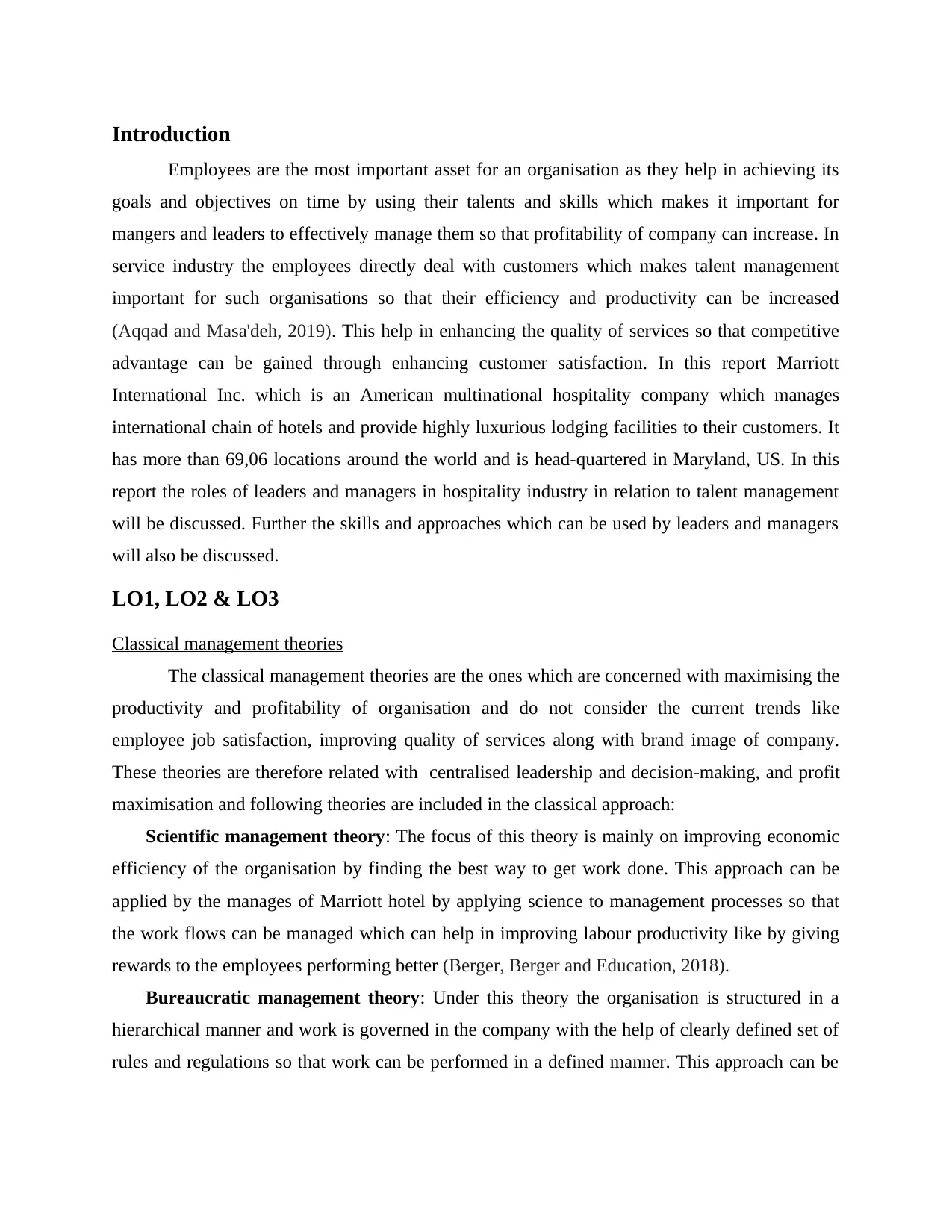
Introduction
Employees are the most important asset for an organisation as they help in achieving its
goals and objectives on time by using their talents and skills which makes it important for
mangers and leaders to effectively manage them so that profitability of company can increase. In
service industry the employees directly deal with customers which makes talent management
important for such organisations so that their efficiency and productivity can be increased
(Aqqad and Masa'deh, 2019). This help in enhancing the quality of services so that competitive
advantage can be gained through enhancing customer satisfaction. In this report Marriott
International Inc. which is an American multinational hospitality company which manages
international chain of hotels and provide highly luxurious lodging facilities to their customers. It
has more than 69,06 locations around the world and is head-quartered in Maryland, US. In this
report the roles of leaders and managers in hospitality industry in relation to talent management
will be discussed. Further the skills and approaches which can be used by leaders and managers
will also be discussed.
LO1, LO2 & LO3
Classical management theories
The classical management theories are the ones which are concerned with maximising the
productivity and profitability of organisation and do not consider the current trends like
employee job satisfaction, improving quality of services along with brand image of company.
These theories are therefore related with centralised leadership and decision-making, and profit
maximisation and following theories are included in the classical approach:
Scientific management theory: The focus of this theory is mainly on improving economic
efficiency of the organisation by finding the best way to get work done. This approach can be
applied by the manages of Marriott hotel by applying science to management processes so that
the work flows can be managed which can help in improving labour productivity like by giving
rewards to the employees performing better (Berger, Berger and Education, 2018).
Bureaucratic management theory: Under this theory the organisation is structured in a
hierarchical manner and work is governed in the company with the help of clearly defined set of
rules and regulations so that work can be performed in a defined manner. This approach can be
Employees are the most important asset for an organisation as they help in achieving its
goals and objectives on time by using their talents and skills which makes it important for
mangers and leaders to effectively manage them so that profitability of company can increase. In
service industry the employees directly deal with customers which makes talent management
important for such organisations so that their efficiency and productivity can be increased
(Aqqad and Masa'deh, 2019). This help in enhancing the quality of services so that competitive
advantage can be gained through enhancing customer satisfaction. In this report Marriott
International Inc. which is an American multinational hospitality company which manages
international chain of hotels and provide highly luxurious lodging facilities to their customers. It
has more than 69,06 locations around the world and is head-quartered in Maryland, US. In this
report the roles of leaders and managers in hospitality industry in relation to talent management
will be discussed. Further the skills and approaches which can be used by leaders and managers
will also be discussed.
LO1, LO2 & LO3
Classical management theories
The classical management theories are the ones which are concerned with maximising the
productivity and profitability of organisation and do not consider the current trends like
employee job satisfaction, improving quality of services along with brand image of company.
These theories are therefore related with centralised leadership and decision-making, and profit
maximisation and following theories are included in the classical approach:
Scientific management theory: The focus of this theory is mainly on improving economic
efficiency of the organisation by finding the best way to get work done. This approach can be
applied by the manages of Marriott hotel by applying science to management processes so that
the work flows can be managed which can help in improving labour productivity like by giving
rewards to the employees performing better (Berger, Berger and Education, 2018).
Bureaucratic management theory: Under this theory the organisation is structured in a
hierarchical manner and work is governed in the company with the help of clearly defined set of
rules and regulations so that work can be performed in a defined manner. This approach can be
⊘ This is a preview!⊘
Do you want full access?
Subscribe today to unlock all pages.

Trusted by 1+ million students worldwide
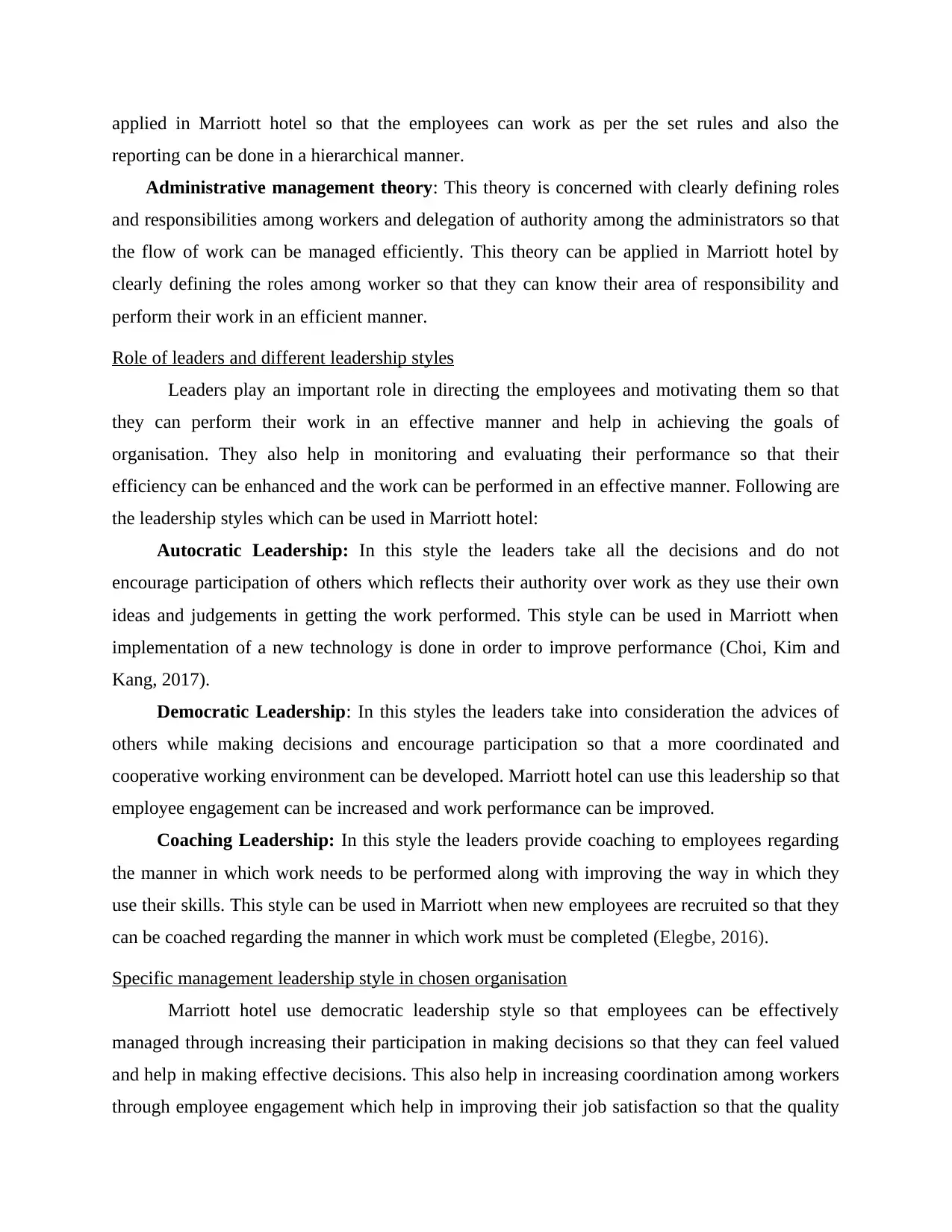
applied in Marriott hotel so that the employees can work as per the set rules and also the
reporting can be done in a hierarchical manner.
Administrative management theory: This theory is concerned with clearly defining roles
and responsibilities among workers and delegation of authority among the administrators so that
the flow of work can be managed efficiently. This theory can be applied in Marriott hotel by
clearly defining the roles among worker so that they can know their area of responsibility and
perform their work in an efficient manner.
Role of leaders and different leadership styles
Leaders play an important role in directing the employees and motivating them so that
they can perform their work in an effective manner and help in achieving the goals of
organisation. They also help in monitoring and evaluating their performance so that their
efficiency can be enhanced and the work can be performed in an effective manner. Following are
the leadership styles which can be used in Marriott hotel:
Autocratic Leadership: In this style the leaders take all the decisions and do not
encourage participation of others which reflects their authority over work as they use their own
ideas and judgements in getting the work performed. This style can be used in Marriott when
implementation of a new technology is done in order to improve performance (Choi, Kim and
Kang, 2017).
Democratic Leadership: In this styles the leaders take into consideration the advices of
others while making decisions and encourage participation so that a more coordinated and
cooperative working environment can be developed. Marriott hotel can use this leadership so that
employee engagement can be increased and work performance can be improved.
Coaching Leadership: In this style the leaders provide coaching to employees regarding
the manner in which work needs to be performed along with improving the way in which they
use their skills. This style can be used in Marriott when new employees are recruited so that they
can be coached regarding the manner in which work must be completed (Elegbe, 2016).
Specific management leadership style in chosen organisation
Marriott hotel use democratic leadership style so that employees can be effectively
managed through increasing their participation in making decisions so that they can feel valued
and help in making effective decisions. This also help in increasing coordination among workers
through employee engagement which help in improving their job satisfaction so that the quality
reporting can be done in a hierarchical manner.
Administrative management theory: This theory is concerned with clearly defining roles
and responsibilities among workers and delegation of authority among the administrators so that
the flow of work can be managed efficiently. This theory can be applied in Marriott hotel by
clearly defining the roles among worker so that they can know their area of responsibility and
perform their work in an efficient manner.
Role of leaders and different leadership styles
Leaders play an important role in directing the employees and motivating them so that
they can perform their work in an effective manner and help in achieving the goals of
organisation. They also help in monitoring and evaluating their performance so that their
efficiency can be enhanced and the work can be performed in an effective manner. Following are
the leadership styles which can be used in Marriott hotel:
Autocratic Leadership: In this style the leaders take all the decisions and do not
encourage participation of others which reflects their authority over work as they use their own
ideas and judgements in getting the work performed. This style can be used in Marriott when
implementation of a new technology is done in order to improve performance (Choi, Kim and
Kang, 2017).
Democratic Leadership: In this styles the leaders take into consideration the advices of
others while making decisions and encourage participation so that a more coordinated and
cooperative working environment can be developed. Marriott hotel can use this leadership so that
employee engagement can be increased and work performance can be improved.
Coaching Leadership: In this style the leaders provide coaching to employees regarding
the manner in which work needs to be performed along with improving the way in which they
use their skills. This style can be used in Marriott when new employees are recruited so that they
can be coached regarding the manner in which work must be completed (Elegbe, 2016).
Specific management leadership style in chosen organisation
Marriott hotel use democratic leadership style so that employees can be effectively
managed through increasing their participation in making decisions so that they can feel valued
and help in making effective decisions. This also help in increasing coordination among workers
through employee engagement which help in improving their job satisfaction so that the quality
Paraphrase This Document
Need a fresh take? Get an instant paraphrase of this document with our AI Paraphraser
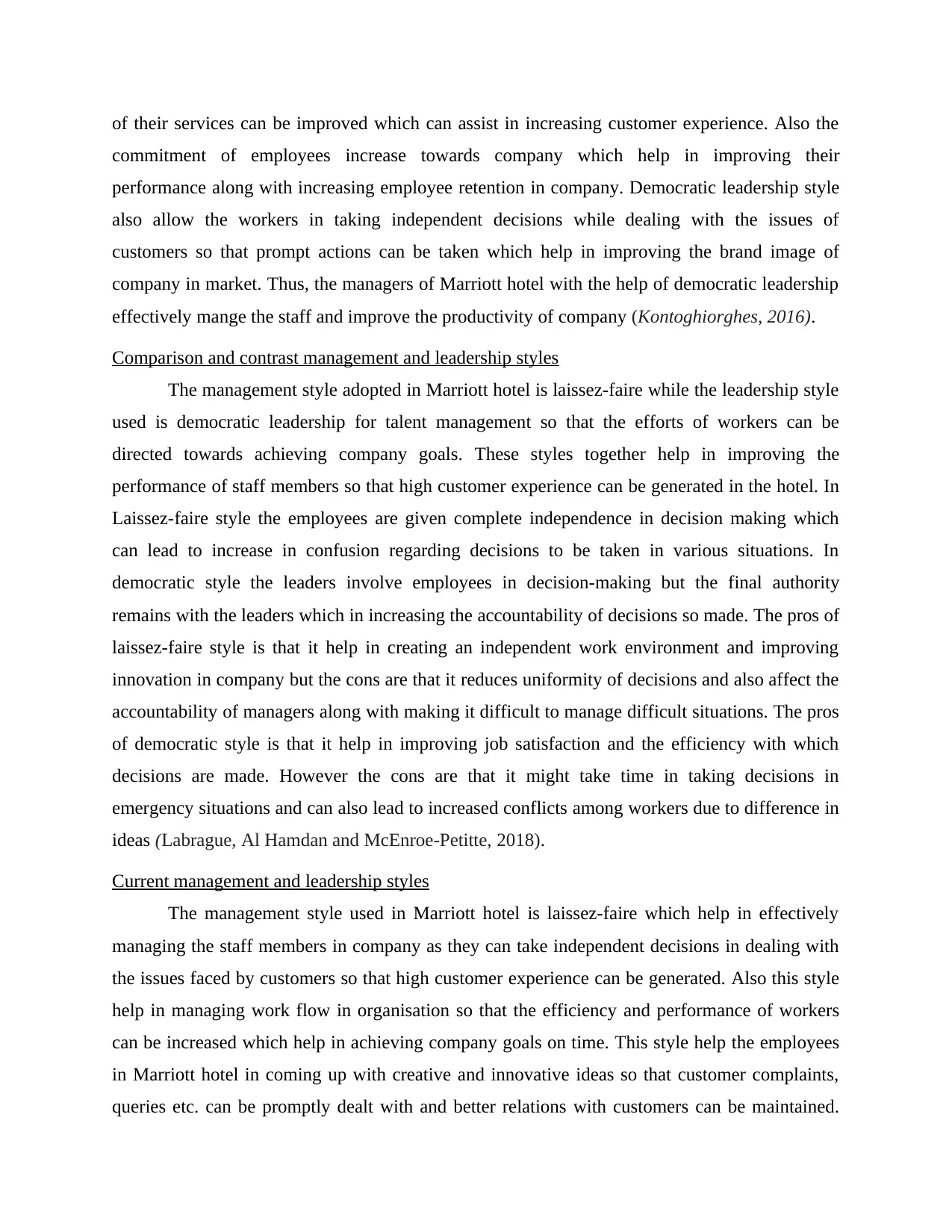
of their services can be improved which can assist in increasing customer experience. Also the
commitment of employees increase towards company which help in improving their
performance along with increasing employee retention in company. Democratic leadership style
also allow the workers in taking independent decisions while dealing with the issues of
customers so that prompt actions can be taken which help in improving the brand image of
company in market. Thus, the managers of Marriott hotel with the help of democratic leadership
effectively mange the staff and improve the productivity of company (Kontoghiorghes, 2016).
Comparison and contrast management and leadership styles
The management style adopted in Marriott hotel is laissez-faire while the leadership style
used is democratic leadership for talent management so that the efforts of workers can be
directed towards achieving company goals. These styles together help in improving the
performance of staff members so that high customer experience can be generated in the hotel. In
Laissez-faire style the employees are given complete independence in decision making which
can lead to increase in confusion regarding decisions to be taken in various situations. In
democratic style the leaders involve employees in decision-making but the final authority
remains with the leaders which in increasing the accountability of decisions so made. The pros of
laissez-faire style is that it help in creating an independent work environment and improving
innovation in company but the cons are that it reduces uniformity of decisions and also affect the
accountability of managers along with making it difficult to manage difficult situations. The pros
of democratic style is that it help in improving job satisfaction and the efficiency with which
decisions are made. However the cons are that it might take time in taking decisions in
emergency situations and can also lead to increased conflicts among workers due to difference in
ideas (Labrague, Al Hamdan and McEnroe‐Petitte, 2018).
Current management and leadership styles
The management style used in Marriott hotel is laissez-faire which help in effectively
managing the staff members in company as they can take independent decisions in dealing with
the issues faced by customers so that high customer experience can be generated. Also this style
help in managing work flow in organisation so that the efficiency and performance of workers
can be increased which help in achieving company goals on time. This style help the employees
in Marriott hotel in coming up with creative and innovative ideas so that customer complaints,
queries etc. can be promptly dealt with and better relations with customers can be maintained.
commitment of employees increase towards company which help in improving their
performance along with increasing employee retention in company. Democratic leadership style
also allow the workers in taking independent decisions while dealing with the issues of
customers so that prompt actions can be taken which help in improving the brand image of
company in market. Thus, the managers of Marriott hotel with the help of democratic leadership
effectively mange the staff and improve the productivity of company (Kontoghiorghes, 2016).
Comparison and contrast management and leadership styles
The management style adopted in Marriott hotel is laissez-faire while the leadership style
used is democratic leadership for talent management so that the efforts of workers can be
directed towards achieving company goals. These styles together help in improving the
performance of staff members so that high customer experience can be generated in the hotel. In
Laissez-faire style the employees are given complete independence in decision making which
can lead to increase in confusion regarding decisions to be taken in various situations. In
democratic style the leaders involve employees in decision-making but the final authority
remains with the leaders which in increasing the accountability of decisions so made. The pros of
laissez-faire style is that it help in creating an independent work environment and improving
innovation in company but the cons are that it reduces uniformity of decisions and also affect the
accountability of managers along with making it difficult to manage difficult situations. The pros
of democratic style is that it help in improving job satisfaction and the efficiency with which
decisions are made. However the cons are that it might take time in taking decisions in
emergency situations and can also lead to increased conflicts among workers due to difference in
ideas (Labrague, Al Hamdan and McEnroe‐Petitte, 2018).
Current management and leadership styles
The management style used in Marriott hotel is laissez-faire which help in effectively
managing the staff members in company as they can take independent decisions in dealing with
the issues faced by customers so that high customer experience can be generated. Also this style
help in managing work flow in organisation so that the efficiency and performance of workers
can be increased which help in achieving company goals on time. This style help the employees
in Marriott hotel in coming up with creative and innovative ideas so that customer complaints,
queries etc. can be promptly dealt with and better relations with customers can be maintained.
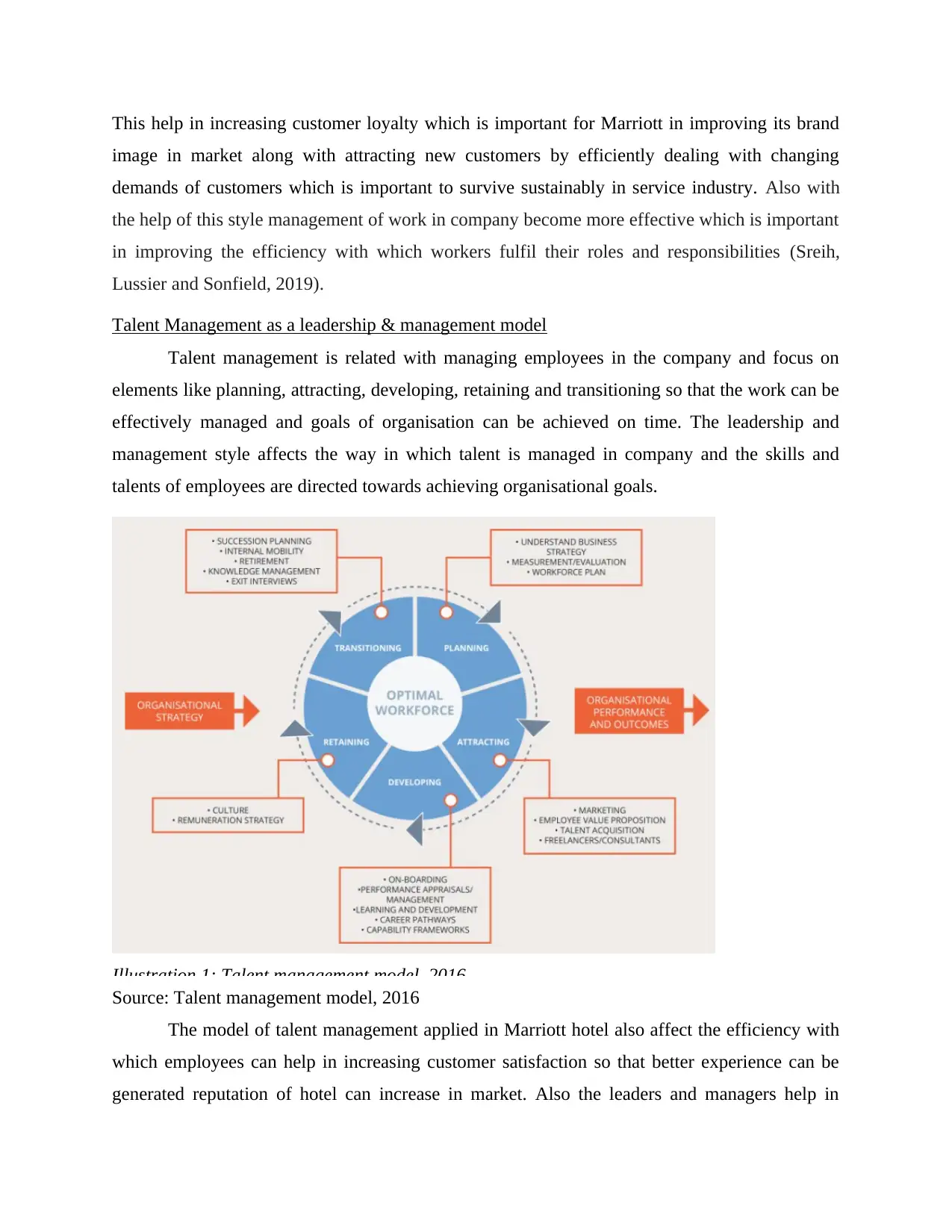
This help in increasing customer loyalty which is important for Marriott in improving its brand
image in market along with attracting new customers by efficiently dealing with changing
demands of customers which is important to survive sustainably in service industry. Also with
the help of this style management of work in company become more effective which is important
in improving the efficiency with which workers fulfil their roles and responsibilities (Sreih,
Lussier and Sonfield, 2019).
Talent Management as a leadership & management model
Talent management is related with managing employees in the company and focus on
elements like planning, attracting, developing, retaining and transitioning so that the work can be
effectively managed and goals of organisation can be achieved on time. The leadership and
management style affects the way in which talent is managed in company and the skills and
talents of employees are directed towards achieving organisational goals.
Illustration 1: Talent management model, 2016
Source: Talent management model, 2016
The model of talent management applied in Marriott hotel also affect the efficiency with
which employees can help in increasing customer satisfaction so that better experience can be
generated reputation of hotel can increase in market. Also the leaders and managers help in
image in market along with attracting new customers by efficiently dealing with changing
demands of customers which is important to survive sustainably in service industry. Also with
the help of this style management of work in company become more effective which is important
in improving the efficiency with which workers fulfil their roles and responsibilities (Sreih,
Lussier and Sonfield, 2019).
Talent Management as a leadership & management model
Talent management is related with managing employees in the company and focus on
elements like planning, attracting, developing, retaining and transitioning so that the work can be
effectively managed and goals of organisation can be achieved on time. The leadership and
management style affects the way in which talent is managed in company and the skills and
talents of employees are directed towards achieving organisational goals.
Illustration 1: Talent management model, 2016
Source: Talent management model, 2016
The model of talent management applied in Marriott hotel also affect the efficiency with
which employees can help in increasing customer satisfaction so that better experience can be
generated reputation of hotel can increase in market. Also the leaders and managers help in
⊘ This is a preview!⊘
Do you want full access?
Subscribe today to unlock all pages.

Trusted by 1+ million students worldwide
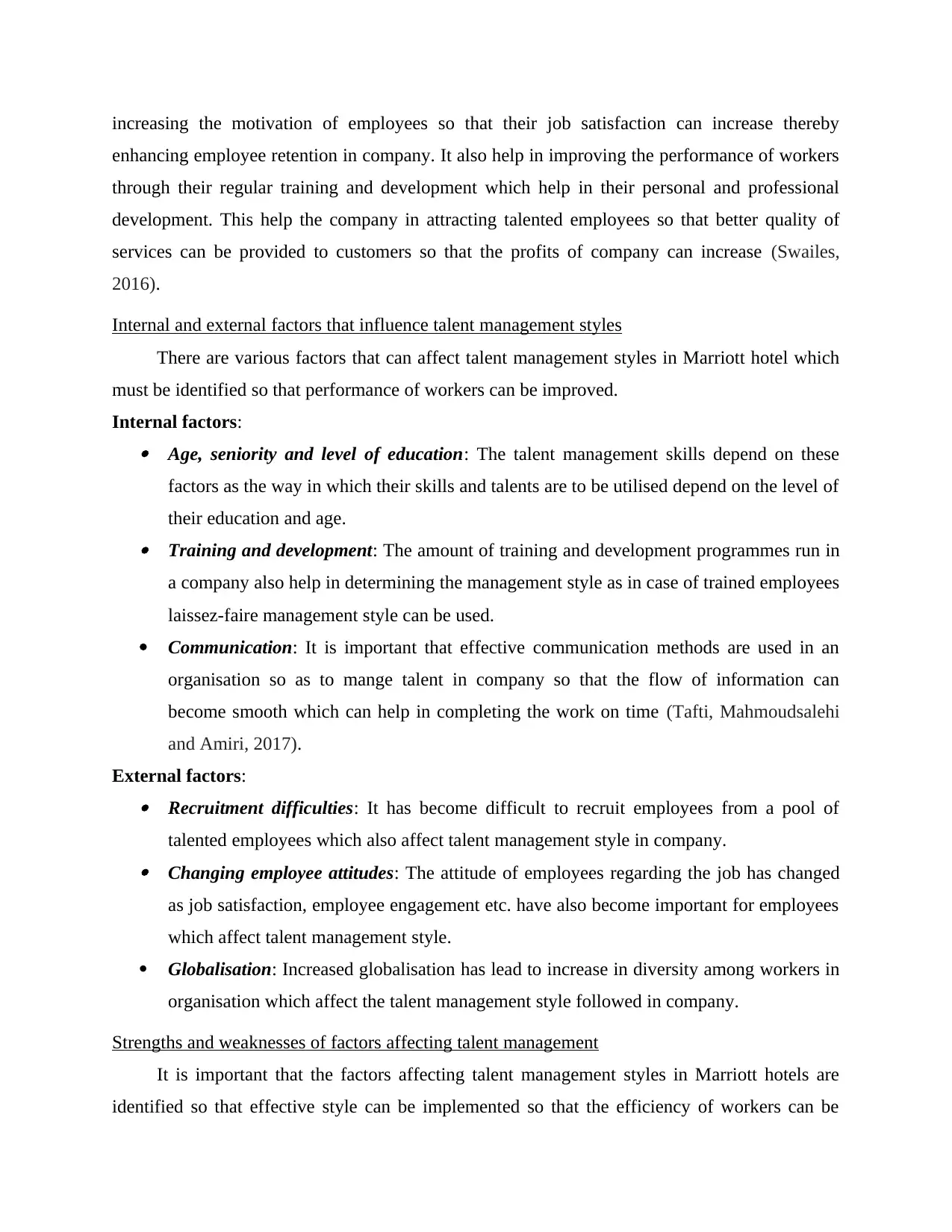
increasing the motivation of employees so that their job satisfaction can increase thereby
enhancing employee retention in company. It also help in improving the performance of workers
through their regular training and development which help in their personal and professional
development. This help the company in attracting talented employees so that better quality of
services can be provided to customers so that the profits of company can increase (Swailes,
2016).
Internal and external factors that influence talent management styles
There are various factors that can affect talent management styles in Marriott hotel which
must be identified so that performance of workers can be improved.
Internal factors: Age, seniority and level of education: The talent management skills depend on these
factors as the way in which their skills and talents are to be utilised depend on the level of
their education and age. Training and development: The amount of training and development programmes run in
a company also help in determining the management style as in case of trained employees
laissez-faire management style can be used.
Communication: It is important that effective communication methods are used in an
organisation so as to mange talent in company so that the flow of information can
become smooth which can help in completing the work on time (Tafti, Mahmoudsalehi
and Amiri, 2017).
External factors: Recruitment difficulties: It has become difficult to recruit employees from a pool of
talented employees which also affect talent management style in company. Changing employee attitudes: The attitude of employees regarding the job has changed
as job satisfaction, employee engagement etc. have also become important for employees
which affect talent management style.
Globalisation: Increased globalisation has lead to increase in diversity among workers in
organisation which affect the talent management style followed in company.
Strengths and weaknesses of factors affecting talent management
It is important that the factors affecting talent management styles in Marriott hotels are
identified so that effective style can be implemented so that the efficiency of workers can be
enhancing employee retention in company. It also help in improving the performance of workers
through their regular training and development which help in their personal and professional
development. This help the company in attracting talented employees so that better quality of
services can be provided to customers so that the profits of company can increase (Swailes,
2016).
Internal and external factors that influence talent management styles
There are various factors that can affect talent management styles in Marriott hotel which
must be identified so that performance of workers can be improved.
Internal factors: Age, seniority and level of education: The talent management skills depend on these
factors as the way in which their skills and talents are to be utilised depend on the level of
their education and age. Training and development: The amount of training and development programmes run in
a company also help in determining the management style as in case of trained employees
laissez-faire management style can be used.
Communication: It is important that effective communication methods are used in an
organisation so as to mange talent in company so that the flow of information can
become smooth which can help in completing the work on time (Tafti, Mahmoudsalehi
and Amiri, 2017).
External factors: Recruitment difficulties: It has become difficult to recruit employees from a pool of
talented employees which also affect talent management style in company. Changing employee attitudes: The attitude of employees regarding the job has changed
as job satisfaction, employee engagement etc. have also become important for employees
which affect talent management style.
Globalisation: Increased globalisation has lead to increase in diversity among workers in
organisation which affect the talent management style followed in company.
Strengths and weaknesses of factors affecting talent management
It is important that the factors affecting talent management styles in Marriott hotels are
identified so that effective style can be implemented so that the efficiency of workers can be
Paraphrase This Document
Need a fresh take? Get an instant paraphrase of this document with our AI Paraphraser
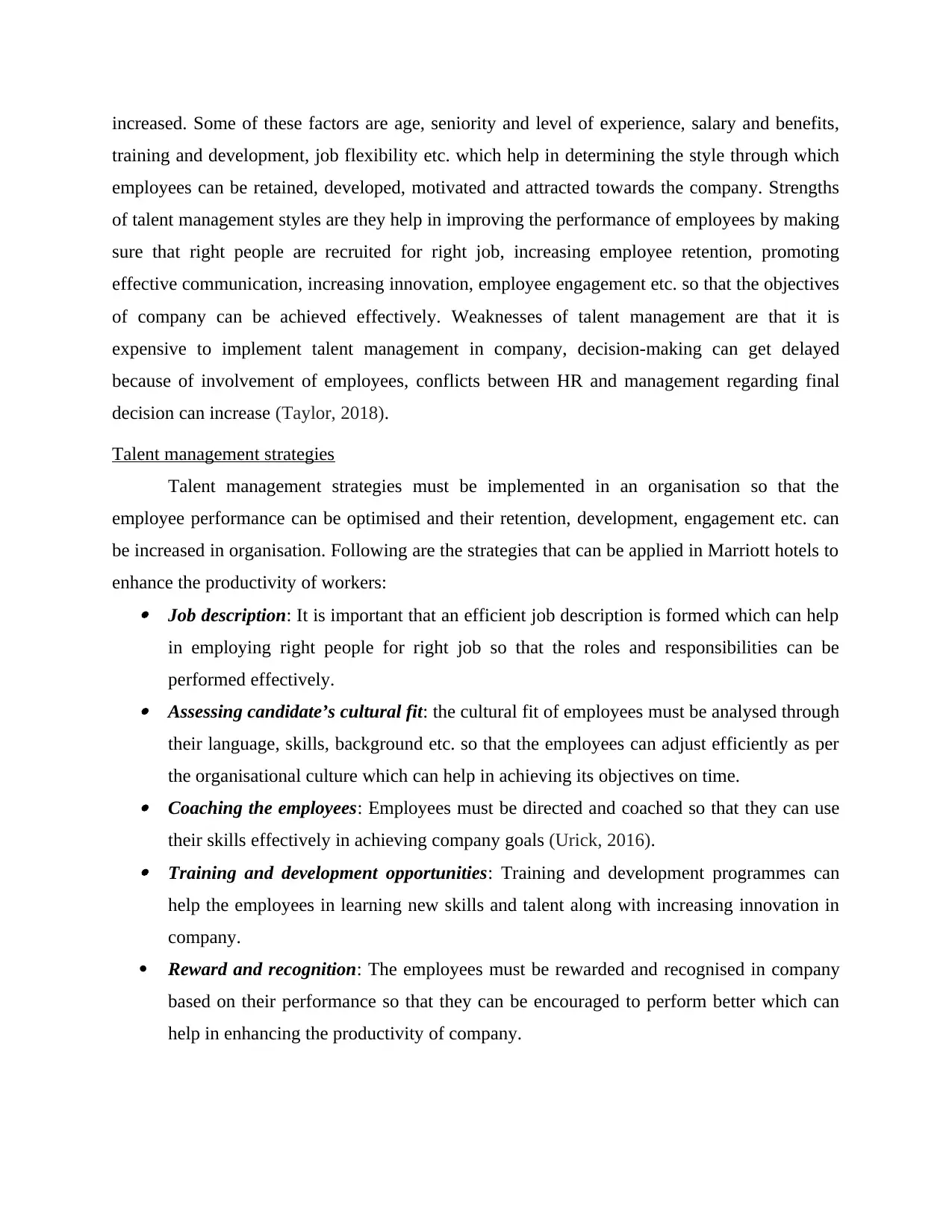
increased. Some of these factors are age, seniority and level of experience, salary and benefits,
training and development, job flexibility etc. which help in determining the style through which
employees can be retained, developed, motivated and attracted towards the company. Strengths
of talent management styles are they help in improving the performance of employees by making
sure that right people are recruited for right job, increasing employee retention, promoting
effective communication, increasing innovation, employee engagement etc. so that the objectives
of company can be achieved effectively. Weaknesses of talent management are that it is
expensive to implement talent management in company, decision-making can get delayed
because of involvement of employees, conflicts between HR and management regarding final
decision can increase (Taylor, 2018).
Talent management strategies
Talent management strategies must be implemented in an organisation so that the
employee performance can be optimised and their retention, development, engagement etc. can
be increased in organisation. Following are the strategies that can be applied in Marriott hotels to
enhance the productivity of workers: Job description: It is important that an efficient job description is formed which can help
in employing right people for right job so that the roles and responsibilities can be
performed effectively. Assessing candidate’s cultural fit: the cultural fit of employees must be analysed through
their language, skills, background etc. so that the employees can adjust efficiently as per
the organisational culture which can help in achieving its objectives on time. Coaching the employees: Employees must be directed and coached so that they can use
their skills effectively in achieving company goals (Urick, 2016). Training and development opportunities: Training and development programmes can
help the employees in learning new skills and talent along with increasing innovation in
company.
Reward and recognition: The employees must be rewarded and recognised in company
based on their performance so that they can be encouraged to perform better which can
help in enhancing the productivity of company.
training and development, job flexibility etc. which help in determining the style through which
employees can be retained, developed, motivated and attracted towards the company. Strengths
of talent management styles are they help in improving the performance of employees by making
sure that right people are recruited for right job, increasing employee retention, promoting
effective communication, increasing innovation, employee engagement etc. so that the objectives
of company can be achieved effectively. Weaknesses of talent management are that it is
expensive to implement talent management in company, decision-making can get delayed
because of involvement of employees, conflicts between HR and management regarding final
decision can increase (Taylor, 2018).
Talent management strategies
Talent management strategies must be implemented in an organisation so that the
employee performance can be optimised and their retention, development, engagement etc. can
be increased in organisation. Following are the strategies that can be applied in Marriott hotels to
enhance the productivity of workers: Job description: It is important that an efficient job description is formed which can help
in employing right people for right job so that the roles and responsibilities can be
performed effectively. Assessing candidate’s cultural fit: the cultural fit of employees must be analysed through
their language, skills, background etc. so that the employees can adjust efficiently as per
the organisational culture which can help in achieving its objectives on time. Coaching the employees: Employees must be directed and coached so that they can use
their skills effectively in achieving company goals (Urick, 2016). Training and development opportunities: Training and development programmes can
help the employees in learning new skills and talent along with increasing innovation in
company.
Reward and recognition: The employees must be rewarded and recognised in company
based on their performance so that they can be encouraged to perform better which can
help in enhancing the productivity of company.
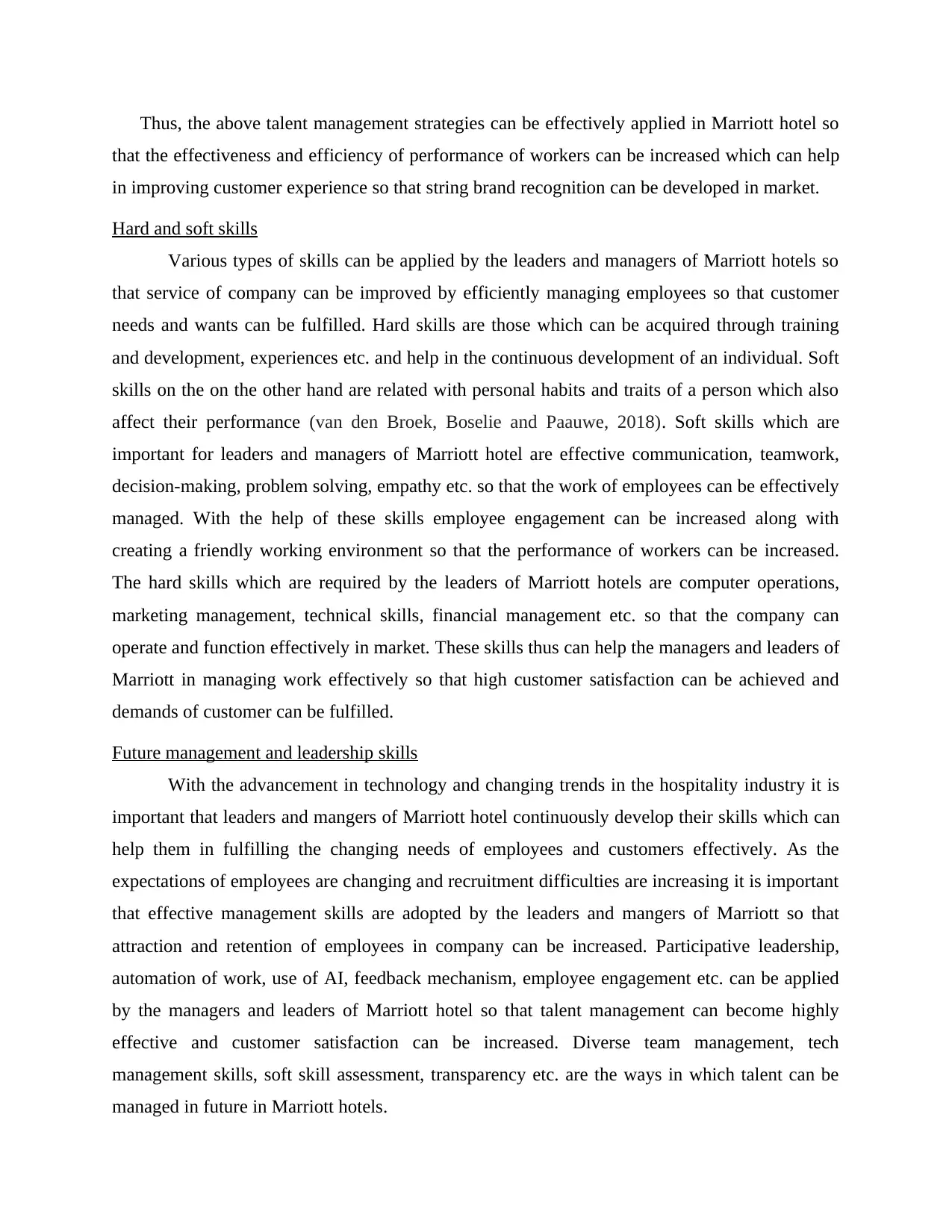
Thus, the above talent management strategies can be effectively applied in Marriott hotel so
that the effectiveness and efficiency of performance of workers can be increased which can help
in improving customer experience so that string brand recognition can be developed in market.
Hard and soft skills
Various types of skills can be applied by the leaders and managers of Marriott hotels so
that service of company can be improved by efficiently managing employees so that customer
needs and wants can be fulfilled. Hard skills are those which can be acquired through training
and development, experiences etc. and help in the continuous development of an individual. Soft
skills on the on the other hand are related with personal habits and traits of a person which also
affect their performance (van den Broek, Boselie and Paauwe, 2018). Soft skills which are
important for leaders and managers of Marriott hotel are effective communication, teamwork,
decision-making, problem solving, empathy etc. so that the work of employees can be effectively
managed. With the help of these skills employee engagement can be increased along with
creating a friendly working environment so that the performance of workers can be increased.
The hard skills which are required by the leaders of Marriott hotels are computer operations,
marketing management, technical skills, financial management etc. so that the company can
operate and function effectively in market. These skills thus can help the managers and leaders of
Marriott in managing work effectively so that high customer satisfaction can be achieved and
demands of customer can be fulfilled.
Future management and leadership skills
With the advancement in technology and changing trends in the hospitality industry it is
important that leaders and mangers of Marriott hotel continuously develop their skills which can
help them in fulfilling the changing needs of employees and customers effectively. As the
expectations of employees are changing and recruitment difficulties are increasing it is important
that effective management skills are adopted by the leaders and mangers of Marriott so that
attraction and retention of employees in company can be increased. Participative leadership,
automation of work, use of AI, feedback mechanism, employee engagement etc. can be applied
by the managers and leaders of Marriott hotel so that talent management can become highly
effective and customer satisfaction can be increased. Diverse team management, tech
management skills, soft skill assessment, transparency etc. are the ways in which talent can be
managed in future in Marriott hotels.
that the effectiveness and efficiency of performance of workers can be increased which can help
in improving customer experience so that string brand recognition can be developed in market.
Hard and soft skills
Various types of skills can be applied by the leaders and managers of Marriott hotels so
that service of company can be improved by efficiently managing employees so that customer
needs and wants can be fulfilled. Hard skills are those which can be acquired through training
and development, experiences etc. and help in the continuous development of an individual. Soft
skills on the on the other hand are related with personal habits and traits of a person which also
affect their performance (van den Broek, Boselie and Paauwe, 2018). Soft skills which are
important for leaders and managers of Marriott hotel are effective communication, teamwork,
decision-making, problem solving, empathy etc. so that the work of employees can be effectively
managed. With the help of these skills employee engagement can be increased along with
creating a friendly working environment so that the performance of workers can be increased.
The hard skills which are required by the leaders of Marriott hotels are computer operations,
marketing management, technical skills, financial management etc. so that the company can
operate and function effectively in market. These skills thus can help the managers and leaders of
Marriott in managing work effectively so that high customer satisfaction can be achieved and
demands of customer can be fulfilled.
Future management and leadership skills
With the advancement in technology and changing trends in the hospitality industry it is
important that leaders and mangers of Marriott hotel continuously develop their skills which can
help them in fulfilling the changing needs of employees and customers effectively. As the
expectations of employees are changing and recruitment difficulties are increasing it is important
that effective management skills are adopted by the leaders and mangers of Marriott so that
attraction and retention of employees in company can be increased. Participative leadership,
automation of work, use of AI, feedback mechanism, employee engagement etc. can be applied
by the managers and leaders of Marriott hotel so that talent management can become highly
effective and customer satisfaction can be increased. Diverse team management, tech
management skills, soft skill assessment, transparency etc. are the ways in which talent can be
managed in future in Marriott hotels.
⊘ This is a preview!⊘
Do you want full access?
Subscribe today to unlock all pages.

Trusted by 1+ million students worldwide
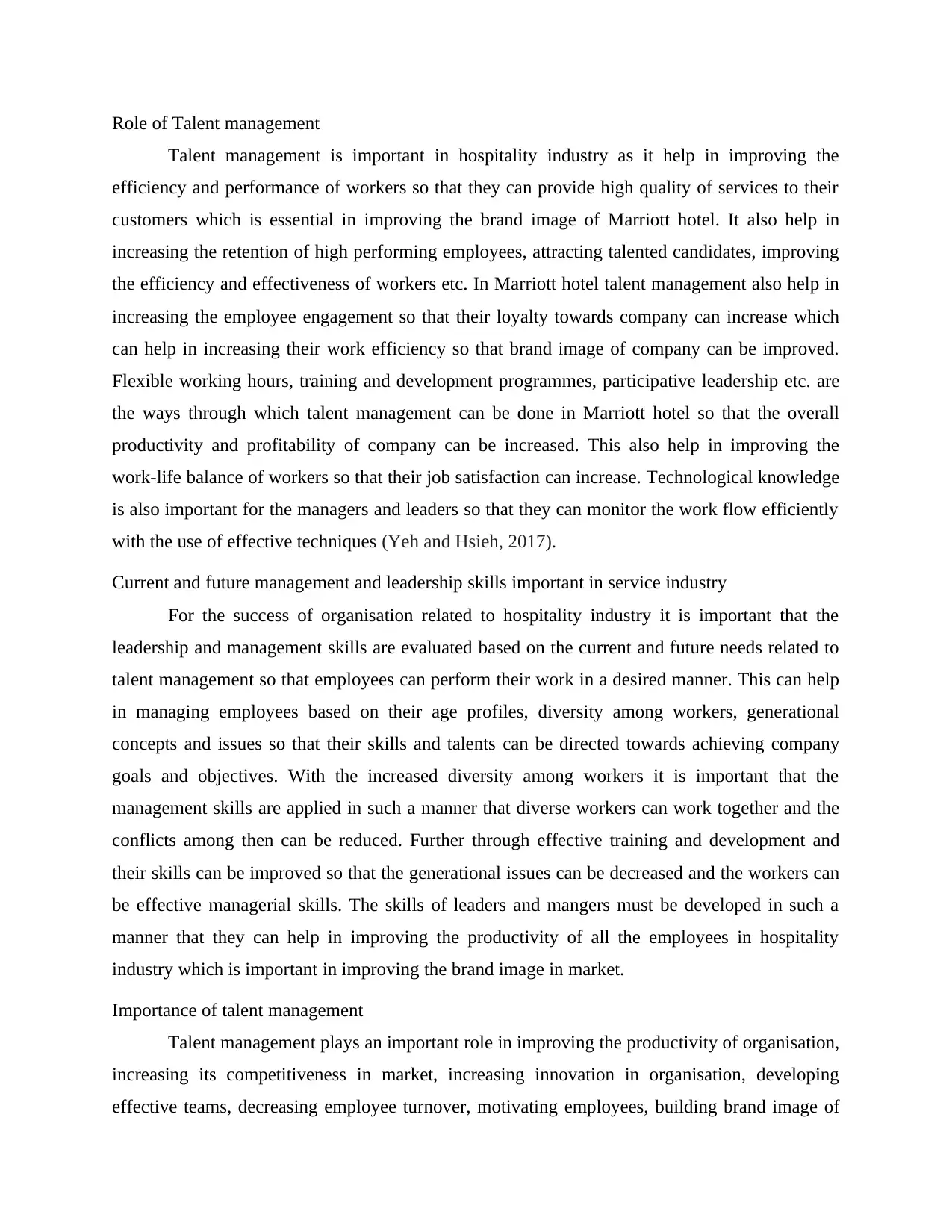
Role of Talent management
Talent management is important in hospitality industry as it help in improving the
efficiency and performance of workers so that they can provide high quality of services to their
customers which is essential in improving the brand image of Marriott hotel. It also help in
increasing the retention of high performing employees, attracting talented candidates, improving
the efficiency and effectiveness of workers etc. In Marriott hotel talent management also help in
increasing the employee engagement so that their loyalty towards company can increase which
can help in increasing their work efficiency so that brand image of company can be improved.
Flexible working hours, training and development programmes, participative leadership etc. are
the ways through which talent management can be done in Marriott hotel so that the overall
productivity and profitability of company can be increased. This also help in improving the
work-life balance of workers so that their job satisfaction can increase. Technological knowledge
is also important for the managers and leaders so that they can monitor the work flow efficiently
with the use of effective techniques (Yeh and Hsieh, 2017).
Current and future management and leadership skills important in service industry
For the success of organisation related to hospitality industry it is important that the
leadership and management skills are evaluated based on the current and future needs related to
talent management so that employees can perform their work in a desired manner. This can help
in managing employees based on their age profiles, diversity among workers, generational
concepts and issues so that their skills and talents can be directed towards achieving company
goals and objectives. With the increased diversity among workers it is important that the
management skills are applied in such a manner that diverse workers can work together and the
conflicts among then can be reduced. Further through effective training and development and
their skills can be improved so that the generational issues can be decreased and the workers can
be effective managerial skills. The skills of leaders and mangers must be developed in such a
manner that they can help in improving the productivity of all the employees in hospitality
industry which is important in improving the brand image in market.
Importance of talent management
Talent management plays an important role in improving the productivity of organisation,
increasing its competitiveness in market, increasing innovation in organisation, developing
effective teams, decreasing employee turnover, motivating employees, building brand image of
Talent management is important in hospitality industry as it help in improving the
efficiency and performance of workers so that they can provide high quality of services to their
customers which is essential in improving the brand image of Marriott hotel. It also help in
increasing the retention of high performing employees, attracting talented candidates, improving
the efficiency and effectiveness of workers etc. In Marriott hotel talent management also help in
increasing the employee engagement so that their loyalty towards company can increase which
can help in increasing their work efficiency so that brand image of company can be improved.
Flexible working hours, training and development programmes, participative leadership etc. are
the ways through which talent management can be done in Marriott hotel so that the overall
productivity and profitability of company can be increased. This also help in improving the
work-life balance of workers so that their job satisfaction can increase. Technological knowledge
is also important for the managers and leaders so that they can monitor the work flow efficiently
with the use of effective techniques (Yeh and Hsieh, 2017).
Current and future management and leadership skills important in service industry
For the success of organisation related to hospitality industry it is important that the
leadership and management skills are evaluated based on the current and future needs related to
talent management so that employees can perform their work in a desired manner. This can help
in managing employees based on their age profiles, diversity among workers, generational
concepts and issues so that their skills and talents can be directed towards achieving company
goals and objectives. With the increased diversity among workers it is important that the
management skills are applied in such a manner that diverse workers can work together and the
conflicts among then can be reduced. Further through effective training and development and
their skills can be improved so that the generational issues can be decreased and the workers can
be effective managerial skills. The skills of leaders and mangers must be developed in such a
manner that they can help in improving the productivity of all the employees in hospitality
industry which is important in improving the brand image in market.
Importance of talent management
Talent management plays an important role in improving the productivity of organisation,
increasing its competitiveness in market, increasing innovation in organisation, developing
effective teams, decreasing employee turnover, motivating employees, building brand image of
Paraphrase This Document
Need a fresh take? Get an instant paraphrase of this document with our AI Paraphraser
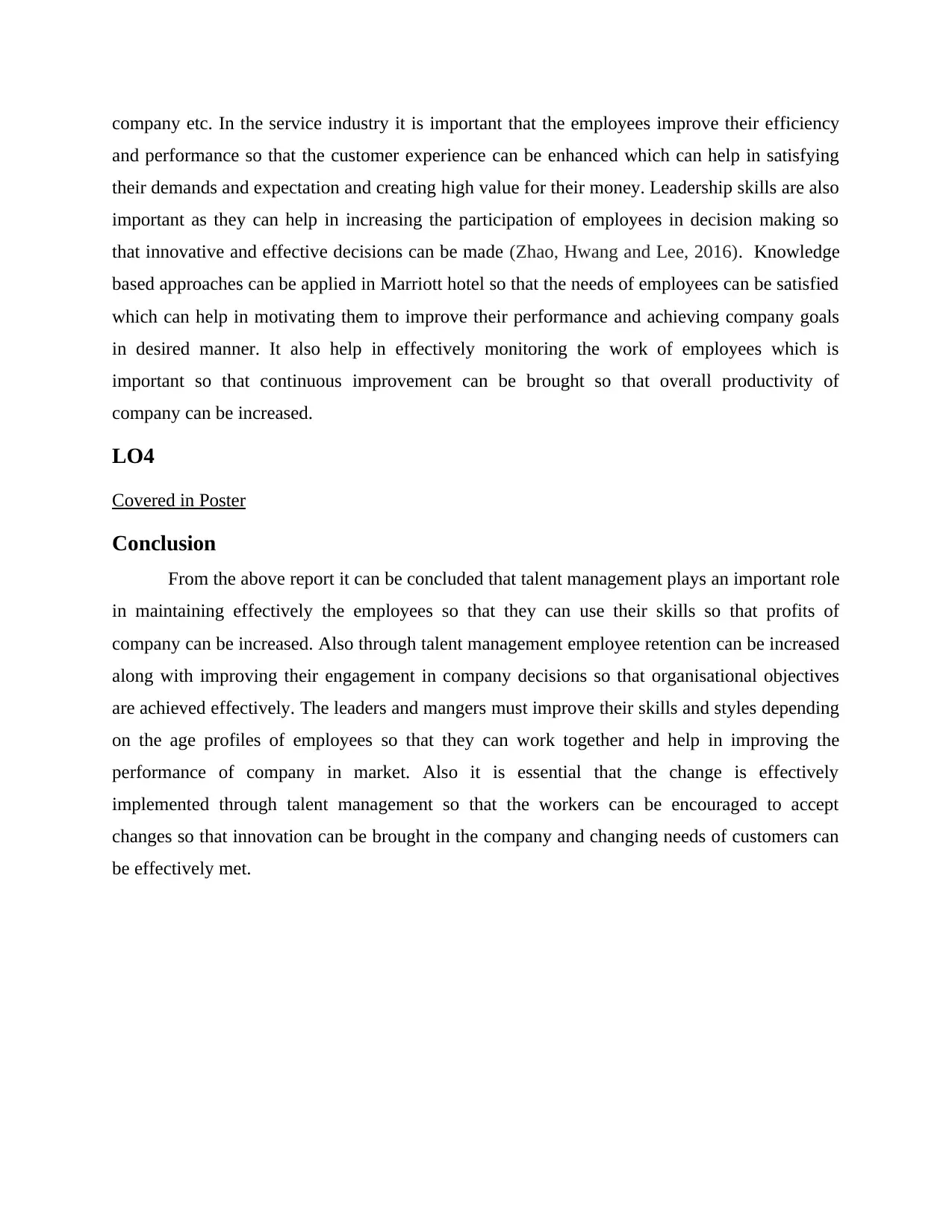
company etc. In the service industry it is important that the employees improve their efficiency
and performance so that the customer experience can be enhanced which can help in satisfying
their demands and expectation and creating high value for their money. Leadership skills are also
important as they can help in increasing the participation of employees in decision making so
that innovative and effective decisions can be made (Zhao, Hwang and Lee, 2016). Knowledge
based approaches can be applied in Marriott hotel so that the needs of employees can be satisfied
which can help in motivating them to improve their performance and achieving company goals
in desired manner. It also help in effectively monitoring the work of employees which is
important so that continuous improvement can be brought so that overall productivity of
company can be increased.
LO4
Covered in Poster
Conclusion
From the above report it can be concluded that talent management plays an important role
in maintaining effectively the employees so that they can use their skills so that profits of
company can be increased. Also through talent management employee retention can be increased
along with improving their engagement in company decisions so that organisational objectives
are achieved effectively. The leaders and mangers must improve their skills and styles depending
on the age profiles of employees so that they can work together and help in improving the
performance of company in market. Also it is essential that the change is effectively
implemented through talent management so that the workers can be encouraged to accept
changes so that innovation can be brought in the company and changing needs of customers can
be effectively met.
and performance so that the customer experience can be enhanced which can help in satisfying
their demands and expectation and creating high value for their money. Leadership skills are also
important as they can help in increasing the participation of employees in decision making so
that innovative and effective decisions can be made (Zhao, Hwang and Lee, 2016). Knowledge
based approaches can be applied in Marriott hotel so that the needs of employees can be satisfied
which can help in motivating them to improve their performance and achieving company goals
in desired manner. It also help in effectively monitoring the work of employees which is
important so that continuous improvement can be brought so that overall productivity of
company can be increased.
LO4
Covered in Poster
Conclusion
From the above report it can be concluded that talent management plays an important role
in maintaining effectively the employees so that they can use their skills so that profits of
company can be increased. Also through talent management employee retention can be increased
along with improving their engagement in company decisions so that organisational objectives
are achieved effectively. The leaders and mangers must improve their skills and styles depending
on the age profiles of employees so that they can work together and help in improving the
performance of company in market. Also it is essential that the change is effectively
implemented through talent management so that the workers can be encouraged to accept
changes so that innovation can be brought in the company and changing needs of customers can
be effectively met.
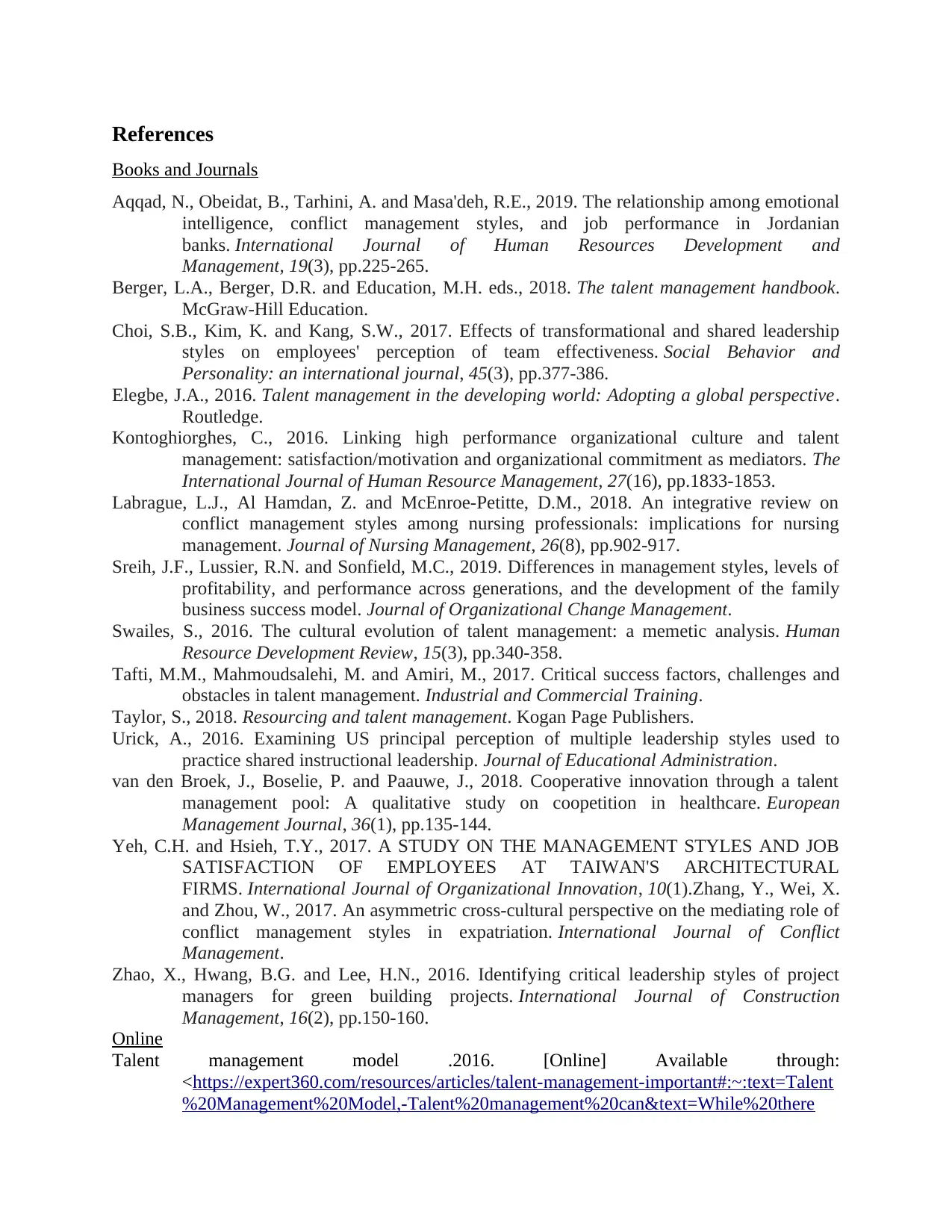
References
Books and Journals
Aqqad, N., Obeidat, B., Tarhini, A. and Masa'deh, R.E., 2019. The relationship among emotional
intelligence, conflict management styles, and job performance in Jordanian
banks. International Journal of Human Resources Development and
Management, 19(3), pp.225-265.
Berger, L.A., Berger, D.R. and Education, M.H. eds., 2018. The talent management handbook.
McGraw-Hill Education.
Choi, S.B., Kim, K. and Kang, S.W., 2017. Effects of transformational and shared leadership
styles on employees' perception of team effectiveness. Social Behavior and
Personality: an international journal, 45(3), pp.377-386.
Elegbe, J.A., 2016. Talent management in the developing world: Adopting a global perspective.
Routledge.
Kontoghiorghes, C., 2016. Linking high performance organizational culture and talent
management: satisfaction/motivation and organizational commitment as mediators. The
International Journal of Human Resource Management, 27(16), pp.1833-1853.
Labrague, L.J., Al Hamdan, Z. and McEnroe‐Petitte, D.M., 2018. An integrative review on
conflict management styles among nursing professionals: implications for nursing
management. Journal of Nursing Management, 26(8), pp.902-917.
Sreih, J.F., Lussier, R.N. and Sonfield, M.C., 2019. Differences in management styles, levels of
profitability, and performance across generations, and the development of the family
business success model. Journal of Organizational Change Management.
Swailes, S., 2016. The cultural evolution of talent management: a memetic analysis. Human
Resource Development Review, 15(3), pp.340-358.
Tafti, M.M., Mahmoudsalehi, M. and Amiri, M., 2017. Critical success factors, challenges and
obstacles in talent management. Industrial and Commercial Training.
Taylor, S., 2018. Resourcing and talent management. Kogan Page Publishers.
Urick, A., 2016. Examining US principal perception of multiple leadership styles used to
practice shared instructional leadership. Journal of Educational Administration.
van den Broek, J., Boselie, P. and Paauwe, J., 2018. Cooperative innovation through a talent
management pool: A qualitative study on coopetition in healthcare. European
Management Journal, 36(1), pp.135-144.
Yeh, C.H. and Hsieh, T.Y., 2017. A STUDY ON THE MANAGEMENT STYLES AND JOB
SATISFACTION OF EMPLOYEES AT TAIWAN'S ARCHITECTURAL
FIRMS. International Journal of Organizational Innovation, 10(1).Zhang, Y., Wei, X.
and Zhou, W., 2017. An asymmetric cross-cultural perspective on the mediating role of
conflict management styles in expatriation. International Journal of Conflict
Management.
Zhao, X., Hwang, B.G. and Lee, H.N., 2016. Identifying critical leadership styles of project
managers for green building projects. International Journal of Construction
Management, 16(2), pp.150-160.
Online
Talent management model .2016. [Online] Available through:
<https://expert360.com/resources/articles/talent-management-important#:~:text=Talent
%20Management%20Model,-Talent%20management%20can&text=While%20there
Books and Journals
Aqqad, N., Obeidat, B., Tarhini, A. and Masa'deh, R.E., 2019. The relationship among emotional
intelligence, conflict management styles, and job performance in Jordanian
banks. International Journal of Human Resources Development and
Management, 19(3), pp.225-265.
Berger, L.A., Berger, D.R. and Education, M.H. eds., 2018. The talent management handbook.
McGraw-Hill Education.
Choi, S.B., Kim, K. and Kang, S.W., 2017. Effects of transformational and shared leadership
styles on employees' perception of team effectiveness. Social Behavior and
Personality: an international journal, 45(3), pp.377-386.
Elegbe, J.A., 2016. Talent management in the developing world: Adopting a global perspective.
Routledge.
Kontoghiorghes, C., 2016. Linking high performance organizational culture and talent
management: satisfaction/motivation and organizational commitment as mediators. The
International Journal of Human Resource Management, 27(16), pp.1833-1853.
Labrague, L.J., Al Hamdan, Z. and McEnroe‐Petitte, D.M., 2018. An integrative review on
conflict management styles among nursing professionals: implications for nursing
management. Journal of Nursing Management, 26(8), pp.902-917.
Sreih, J.F., Lussier, R.N. and Sonfield, M.C., 2019. Differences in management styles, levels of
profitability, and performance across generations, and the development of the family
business success model. Journal of Organizational Change Management.
Swailes, S., 2016. The cultural evolution of talent management: a memetic analysis. Human
Resource Development Review, 15(3), pp.340-358.
Tafti, M.M., Mahmoudsalehi, M. and Amiri, M., 2017. Critical success factors, challenges and
obstacles in talent management. Industrial and Commercial Training.
Taylor, S., 2018. Resourcing and talent management. Kogan Page Publishers.
Urick, A., 2016. Examining US principal perception of multiple leadership styles used to
practice shared instructional leadership. Journal of Educational Administration.
van den Broek, J., Boselie, P. and Paauwe, J., 2018. Cooperative innovation through a talent
management pool: A qualitative study on coopetition in healthcare. European
Management Journal, 36(1), pp.135-144.
Yeh, C.H. and Hsieh, T.Y., 2017. A STUDY ON THE MANAGEMENT STYLES AND JOB
SATISFACTION OF EMPLOYEES AT TAIWAN'S ARCHITECTURAL
FIRMS. International Journal of Organizational Innovation, 10(1).Zhang, Y., Wei, X.
and Zhou, W., 2017. An asymmetric cross-cultural perspective on the mediating role of
conflict management styles in expatriation. International Journal of Conflict
Management.
Zhao, X., Hwang, B.G. and Lee, H.N., 2016. Identifying critical leadership styles of project
managers for green building projects. International Journal of Construction
Management, 16(2), pp.150-160.
Online
Talent management model .2016. [Online] Available through:
<https://expert360.com/resources/articles/talent-management-important#:~:text=Talent
%20Management%20Model,-Talent%20management%20can&text=While%20there
⊘ This is a preview!⊘
Do you want full access?
Subscribe today to unlock all pages.

Trusted by 1+ million students worldwide
1 out of 13
Related Documents
Your All-in-One AI-Powered Toolkit for Academic Success.
+13062052269
info@desklib.com
Available 24*7 on WhatsApp / Email
![[object Object]](/_next/static/media/star-bottom.7253800d.svg)
Unlock your academic potential
Copyright © 2020–2026 A2Z Services. All Rights Reserved. Developed and managed by ZUCOL.





